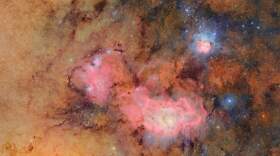-
Household waste increases by 25% between Thanksgiving and New Years. Rules vary by municipality on what you can recycle and what needs to go into the trash.
-
Snow isn't always white; algae can make it look green, red, or orange, and scientists are trying to understand how and why these colorful patches appear.
-
A new telescope equipped with the world's largest digital camera will collect more astronomical data in a single year than all others combined.
-
Former President Gerald Ford signed the Metric Conversion Act 50 years ago. However, he did not make metric adoption mandatory, and the efforts fell flat.
-
Scientists have developed an experimental way to study how human embryos implant in a uterus, which may provide new insights into why miscarriages occur and how they can be prevented.
-
Trump administration officials say changes to federal agencies engaged in science were made in the interests of better science that benefits more Americans. Many scientists we spoke with disagree.
-
Officials said the error is likely too minute for the general public to clock it, but it could affect applications such as critical infrastructure, telecommunications and GPS signals.
-
Researchers retrieved reef monitoring devices that had been placed in deep coral reefs in Guam. The devices were placed up to 330 feet below the surface.
-
A wildlife photographer was following tracks of deer and vulture when he stumbled across thousands of dinosaur tracks spanning hundreds of meters.
-
Trump withdrew Isaacman's nomination in May, citing the billionaire's donations to Democrats and ties to Elon Musk. He was renominated last month and confirmed by a 67-30 Senate vote on Wednesday.
-
A nature photographer stumbled upon thousands of 210-million-year-old dinosaur tracks in Italy's central Alps, near where some Olympic skiing and snowboarding events will be held in February.
-
Researchers found our brains go through five distinct phases from birth to old age.











